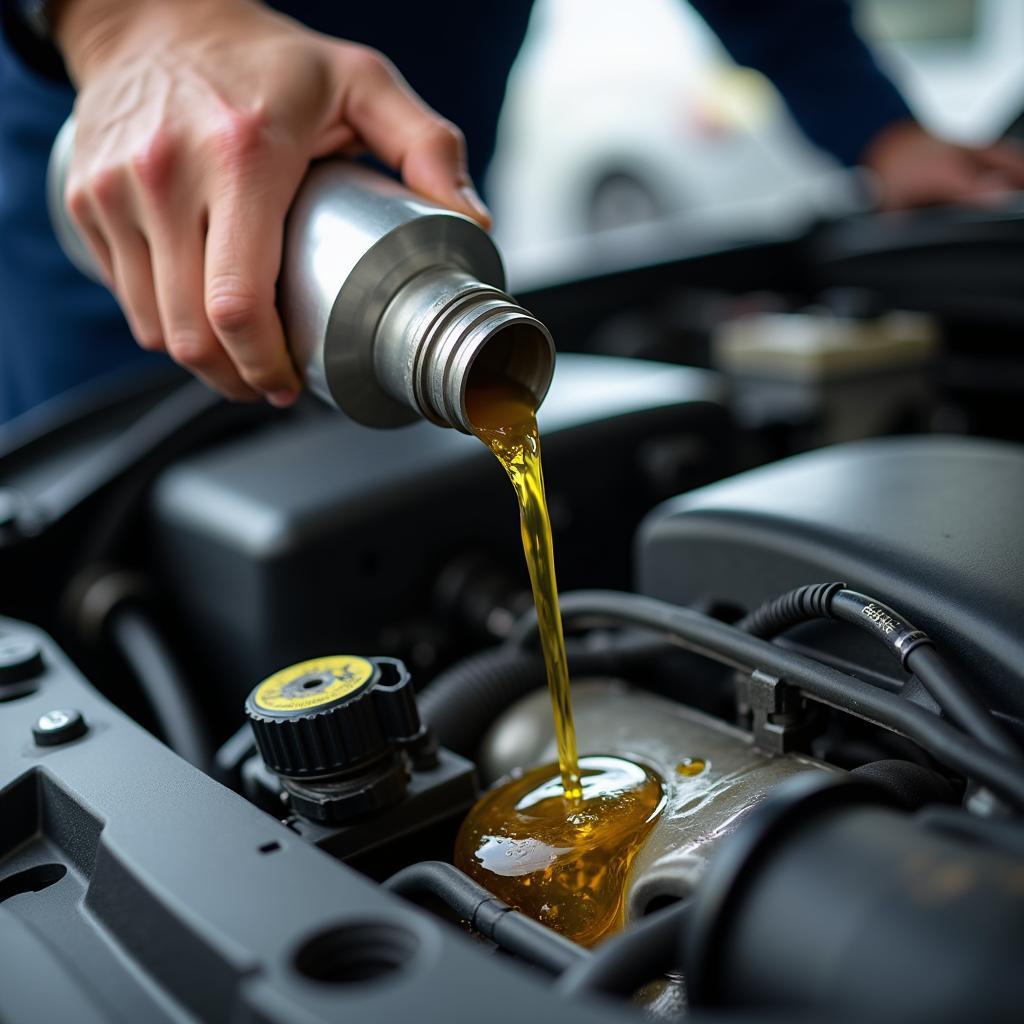Maintaining your car can feel like navigating a maze of technical terms and scheduled appointments. One phrase that often pops up is “oil services.” But what does it really mean?
Simply put, oil services refer to a range of maintenance procedures centered around your car’s engine oil. It’s much more than just an oil change, although that’s a crucial part of it. Oil services are vital for the health and longevity of your vehicle’s engine, ensuring it runs smoothly and efficiently for years to come.
Why are Oil Services Important for Your Car?
Think of engine oil as your car’s lifeblood. It’s responsible for lubricating moving parts, reducing friction and preventing wear and tear. As your engine runs, this oil gradually degrades, losing its effectiveness. This is where regular oil services come in.
Ignoring oil services can lead to several problems, from reduced fuel efficiency to catastrophic engine failure. Regular maintenance helps prevent:
- Excessive Engine Wear: Without proper lubrication, engine components grind against each other, leading to premature wear and costly repairs.
- Overheating: Oil helps regulate engine temperature. Degraded oil can’t dissipate heat efficiently, increasing the risk of overheating.
- Decreased Fuel Efficiency: Thickened, dirty oil creates more resistance, forcing your engine to work harder and consume more fuel.
- Engine Damage: In extreme cases, neglecting oil services can lead to complete engine failure, requiring a costly replacement.
 Car Engine Oil Change
Car Engine Oil Change
What’s Included in a Typical Oil Service?
An oil service typically involves the following:
- Oil Change: Replacing the old, contaminated oil with fresh, high-quality oil suited to your car’s make and model.
- Oil Filter Replacement: The oil filter traps dirt and debris, preventing them from circulating back into the engine. This filter needs to be replaced regularly to maintain its efficiency.
- Fluid Level Check: Mechanics will inspect and top off other essential fluids like coolant, brake fluid, power steering fluid, and windshield washer fluid.
- Visual Inspection: A thorough visual inspection of the engine bay may reveal potential issues like leaks, worn belts, or damaged hoses.
How Often Should You Get an Oil Service?
The frequency of oil services depends on several factors, including:
- Vehicle Age: Newer cars often have longer oil change intervals thanks to advances in engine technology and oil formulations.
- Driving Conditions: Frequent stop-and-go driving, towing, or driving in extreme weather conditions can necessitate more frequent oil changes.
- Oil Type: Synthetic oils generally last longer than conventional oils, allowing for extended oil change intervals.
Always consult your owner’s manual for manufacturer-recommended service intervals. However, as a general rule of thumb:
- Conventional Oil: Every 3,000 miles or 3 months.
- Synthetic Blend Oil: Every 5,000-7,500 miles or 6 months.
- Full Synthetic Oil: Every 7,500-10,000 miles or 12 months.
Choosing the Right Oil for Your Car
Selecting the correct engine oil is crucial for optimal engine performance and protection. Consider these factors:
- Viscosity: Viscosity refers to the oil’s resistance to flow. Your owner’s manual will specify the recommended viscosity grade for your engine.
- Type: Conventional, synthetic blend, and full synthetic oils offer varying levels of performance and longevity.
- Manufacturer Specifications: Always refer to your owner’s manual for recommended oil specifications.
“Choosing the wrong oil can be detrimental to your engine. It’s always best to stick with the manufacturer’s recommendations,” advises John Miller, a senior automotive engineer at CarServiceRemote.
Recognizing Signs Your Car Needs an Oil Service
While adhering to scheduled maintenance is crucial, your car may sometimes signal the need for an oil service sooner. Be on the lookout for:
- Oil Pressure Warning Light: This is a critical warning sign indicating low oil pressure, which can cause severe engine damage.
- Dark, Dirty Oil: Check your oil dipstick. If the oil appears very dark or gritty, it’s time for an oil change.
- Increased Engine Noise: If you notice unusual noises like ticking or knocking, it could indicate inadequate lubrication.
- Burning Oil Smell: A distinct burning oil smell inside the cabin can signal an oil leak or burning.
Conclusion
Oil services are an essential aspect of car maintenance, ensuring your engine’s health and performance for miles to come. By understanding the importance of oil services and recognizing the signs of trouble, you can keep your car running smoothly and avoid costly repairs down the road.
Remember, regular oil services are a small investment for a significant return – the longevity and optimal performance of your vehicle.
